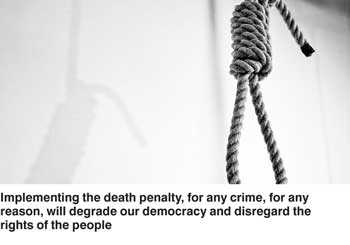Thursday Feb 26, 2026
Thursday Feb 26, 2026
Saturday, 21 July 2018 00:00 - - {{hitsCtrl.values.hits}}
 By Women and Media Collective
By Women and Media Collective
As feminist activists, human rights defenders, university teachers, academics, women’s rights organisations and as citizens involved in working towards the realisation of the equal rights of all people, we strongly condemn any attempts by the President and others in the Government to implement the death penalty.
We were shocked to read international and national news reports about attempts to reinstate an active death penalty as a punishment for ‘drug dealers’ and ‘drug traffickers’ in Sri Lanka. In a report in the international press, President Sirisena is quoted as having said, “From now on, we will hang drug offenders without commuting their death sentences.”
Sri Lanka has created itself a positive reputation in this regard since the 1970s, commuting death sentences rather than using the death penalty. It set a strong example of progressive humanist values through this policy, internationally, but particularly in the region.
Since Sri Lanka is a country which considers itself deeply spiritual and religious, we were also shocked to read that religious leaders, such as the Buddhist Mahanayakes and Cardinal Malcolm Ranjith, had agreed with the decision.
We believe that implementing the death penalty, for any crime, for any reason, will degrade our democracy and disregard the rights of the people. It will dismantle any hopes we have of building a peaceful, accountable and equal society which values human life and human rights; it further erodes our hopes for a people-centric governance model.
No ‘success’ in the Philippines
We also read that this decision was made in order to ‘replicate the success’ of Philippine President Duterte’s ‘war against drugs’ in the Philippines.
To the contrary, we would like to remind President Sirisena that Duterte’s ‘war on drugs’ has drawn global criticism and has been shown to be a gross violation of international human rights laws and conventions on every count. Filipina human rights defenders have repeatedly called for an end to the killing, while themselves coming under direct threat and attack under this regime.
The Human Rights Watch World Report (2018) states that the death toll is now at more than 12,000 in the Philippines, between the violence of armed death-squads and police operations. HRW says that of those executed, a majority were poor, and that the list also included children.
Violence against women
In the past, the issue of violence against women and girls has frequently been invoked in arguments for the use of the death penalty; particularly cases of sexual violence against minors. In 2015, following the rape and murder of a five-year old (Seya Sadewmi), this debate resurfaced. However, resisting populist demands at the time, the cabinet made a commitment to examine the root causes of such violence.
A news report in the Daily Mirror states that the Government may consider including ‘rape’ and ‘murder’ in the list of heinous crimes punishable by death, along with drug-trafficking.
As many of us work on women’s rights and try to maintain feminist principles in our practices, we resolutely resist any attempts to justify the use of the death penalty for crimes of sexual violence against women and girls. Most women survivors of violence wish to see true and impartial justice delivered to them through fair trials and convictions, and through a more robust enforcement of existing laws.
Justice for the people
We wish to assert the urgent need for reforms within our justice system. The Sri Lankan justice system often does not deliver justice to the people; we are barred by severe delays in the courts systems, corruption, the abuse of power, and biased and prejudicial proceedings and frequent miscarriages of justice.
Certain persons and groups are severely disadvantaged in this system, because of gender, ethnicity and language, and class and socio-economic status. Certain populations remain criminalised in our penal code (such as those belonging to sexual minorities) and therefore have almost no access to justice, even when they are victims of a crime. We are worried about what the implementation of the death penalty means in a context of continued and increasing militarisation, alongside legislation such as the Prevention of Terrorism Act, which dangerously contravenes fundamental human rights.
In a climate of increasing anxiety about the safety of our civil, political and socio-economic rights, we appeal to President Sirisena and others in Government to immediately withdraw attempts to re-implement the death penalty in Sri Lanka.
We would also like to remind the President that the people gave the new government a very clear mandate in 2015, and the abolition of the executive presidency was critical to that mandate. We see this latest development as an extension of the President’s executive powers and therefore in direct contravention with the people’s demands.